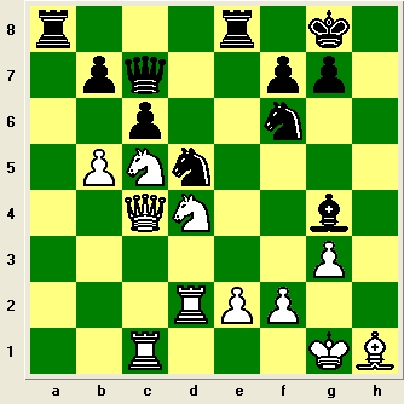4/14/2005 -
Garry Kasparov is writing about how chess can be used to help you with
life. His book "When life imitates chessĒ will come out in the fall. I have
read quotes from top players who say Chess is life. Maurice Ashley is
teaching a college course on how chess can help teachers.
Being only a class
A player, I think chess can help people. One lesson that chess has
taught me, is to look deeper into a problem. It taught me to look beyond the
roadblock that blocks your path. Chess teaches you to look for ways to get around
a blockage, or ways to just walk right thru it.
Often times, a roadblock isnít a roadblock at all. Chess has taught me to
consider the seemingly impossible. Chess has taught me to temporarily
suspend conventional
wisdom. It's good to use conventional wisdom as a guide, but sometimes this
guide can blind us to other possibilities.
Chess is an infinite game. There are more potential positions in
chess than atoms in the universe. In order to play at the top levels you
must look deeply into a position. You must be able to propagate positions in
your mind many moves deep. However this is not always the case. Sometimes you
can find deep ideas by just finding that one move that allows you to see
deeply into a position. This type of move is sometimes seemingly impossible
or a move that goes against the conventional wisdoms of the game. Itís a
move that looks like a blunder at first or 2nd glance. Amateurs and even top players
donít even considers it.
Sometimes with chess, once you find that key move, deep plans can play themselves. Itís a move that transforms the position
and gives you a deep understanding of the position. It is
a move that dictates the course of a game. This move is like a Eureka in
science.
I think scientists might be able to find a cure for HIV by
temporarily suspending the conventional wisdoms regarding microbiology. This
is hard to do; after all itís the conventional wisdom that helps find cures
for many diseases. Conventional wisdom is needed to keep things in order.
But sometimes, conventional wisdom is the roadblock. Sometimes it pays to
suspend it momentarily, in order to consider other possibilities. It is this kind of
thinking that leads to great discoveries. Often after deep
analysis these great discoveries are consistent with conventional wisdom.
There have been many seemingly impossible moves played on a chessboard. One
such move that springs to mind was covered in Garry Kasparov's book ďMy great
predecessors part oneĒ. The third world champion, Alexander Alekhine found
many seemingly impossible moves at the chessboard. In 1925 at the
Baden-Baden tournament, Alekhine from the black side of the board took on
Richard Reti, one of the fathers of hyper modernism. Conventional chess
wisdom says the rook is worth 5 pawns. You donít want to move your rook into
harms way, unless you get something substantial in return. After debating
the Reti opening for 26 moves, the following position occurred on the board:
It's Alekhine's move:

|
Most amateurs and top players
would not even consider the move that Alekhine played. After all it goes
against conventional wisdom. You donít carelessly put your rook in harms
way. In order to find this move, you must consider the seemingly impossible.
You must suspend conventional wisdom for a moment and consider the
impossible. Alekhine did just that and played 26..Re3. He placed his rook in
harms way. However, the following line 27 fxe3??, Qxg3+, 28.Bg2 Nxe3 shows
us that the rook is really not in harms way after all. Alekhine also
threats 27 Ö Rxg3+.
After the game Alekhine made the following comments about this move: "It
seems almost incredible that this spectacular move not only stops white's
attack but even brings him serious trouble." We realize now that this
move, 26.. Re3 is consistent with conventional chess wisdom. But we also
realize that conventional chess wisdom prevents us from seeing it. Alekhine
did get something substantial by placing his rook in harms way. Alekhine
went on to win the game in 42 moves.
|
